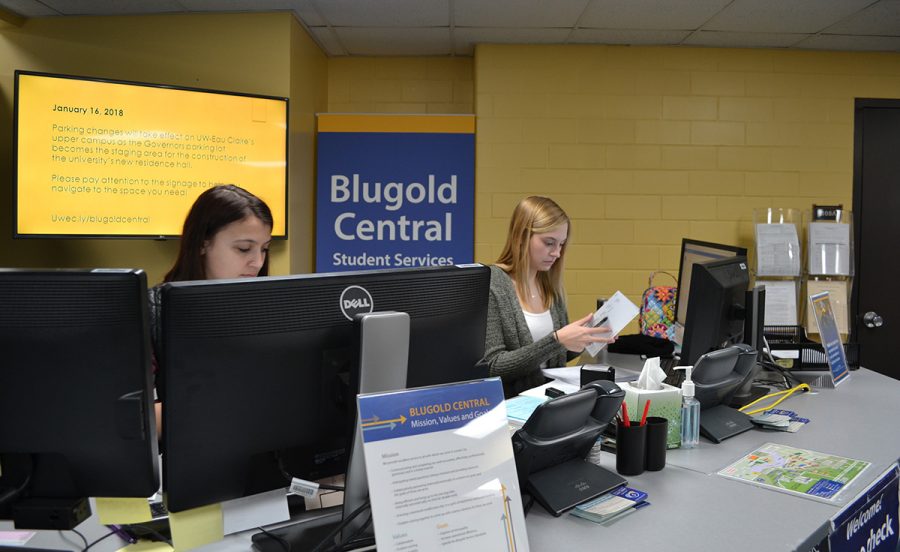Tuition increases for nonresident students
UW System Board of Regents approves tuition changes at three UW schools
More stories from Rachyl Houterman
Photo by Kar Wei Cheng
Mike Rindo, the assistant chancellor for facilities and university relations, said the money will be used to increase the number of high-impact practices––such as internships or undergraduate research––that students experience before graduation.
Non-resident undergraduate and graduate students at UW-Eau Claire can expect to pay more in tuition beginning this fall after a request from the university was approved last week.
The UW System Board of Regents approved the increase at its Thursday, Feb. 8 meeting, along with two other UW schools — UW-Stout and UW-Milwaukee.
UW-Eau Claire nonresident undergraduate tuition will increase $355, while those in the Materials Science and Engineering program will increase $391. Tuition for nonresident graduate students will increase $430.
According to the UW-Eau Claire Factbook, nonresident students comprise 8 percent of the student body.
Reciprocity agreements with neighboring states will not be affected by the increase nor will resident tuition, which has been frozen since 2013.
Mike Rindo, the assistant chancellor for facilities and university relations, called the change a “modest increase” influenced by inflation and market-based analysis.
“We think it’s more of a market adjustment than a big increase,” Rindo said.
The increase is anticipated to bring in an additional $150,000 annually, Rindo said, and will benefit initiatives outlined in the Academic Master Plan; the Equity, Diversity and Inclusivity Plan; and UW-Eau Claire’s Strategic Plan 2016-20.
Rindo said there aren’t concerns that the tuition increase will negatively impact enrollment rates, and he speculates the change will actually improve retention rates.
“It (the increase) really is aimed at helping us achieve a lot of our retention goals,” Rindo said. “The money will be used for ensuring that we’re meeting our institutional guidepost goals of 100 percent of our students having at least one high-impact practice. And we know that high-impact practices actually improve retention.”
High-impact practices include things such as internships and collaborative undergraduate research.
Student Body President Katy McGarry expressed concern over how the tuition increase would impact enrollment and retention, and said she thinks it sends a negative message to the affected students.
“As a student leader, I never can support a tuition increase,” McGarry said. “While I understand the needs of the institution, I’m always looking for ways to make college affordability a top priority of students in the institution.”
Student leaders were not consulted before the increase was approved, leading to frustration and concern at Monday’s Student Senate meeting that shared governance is being overlooked.
Just a week before the Board of Regents approved the tuition increase, a WPR story revealed emails from UW System President Ray Cross dismissing shared governance leaders ahead of the UW System restructuring proposal public announcement.
“Getting hammered by the ‘shared governance’ leaders because they weren’t involved in the process; however, had they been involved we wouldn’t be doing anything!!” Cross wrote in an email.
Despite student concerns, Rindo said he’s unsure of whether students have ever been consulted in tuition changes in the past since they don’t have governance rights over tuition.
Students were heavily involved in the Blugold Commitment Differential Tuition plan enacted in Fall 2010, which increased undergraduate differential tuition by $1,200 in $300 increments (per academic year) over four years. The final $300 installment was suspended in 2013 following the statewide resident tuition freeze.
Nonetheless, McGarry said student leaders would like to move forward with more discussion, both to provide input and to hear out the institution. When shared governance isn’t involved in the conversation, McGarry said, it leads to frustration and inhibits student leaders’ ability to carry out their duties.
“When we’re not able to answer the concerns of the students we represent, that feels like a problem,” McGarry said.
Student Senate issued a news release last Thursday opposing the tuition increase, as well as passing a resolution taking the same stance.











